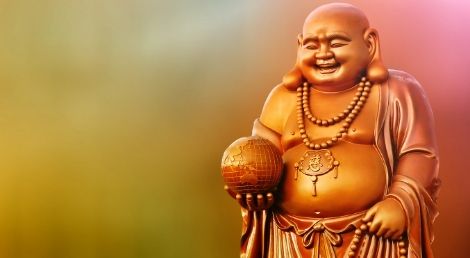Laughing Buddha
Significance And Benefits of Laughing Buddha
The Laughing Buddha is a symbol of good fortune, contentment, and wealth. It signifies plenty in all areas of one's life, whether it's wealth, pleasure, or fulfilment.
Smiling Buddha or heavenly Buddha is also known as Hotei or Pu-Tai and is usually portrayed as fat, laughing bald guy with an obviously displayed pot-belly tummy.
His look is claimed to be based on that of a Buddhist Zen monk who lived over 1000 years ago. His name came from his big stomach and cheerful smile.
Despite being Feng Shui symbol, the smiling Buddha has lot of meaning in our lives. Most of us are convinced that keeping things going in one way satisfies certain goals. As a result, it's critical to understand which direction it should be kept in and which sort of it should be employed by individuals.
In reality, everyone wishes to attract good fortune and luck, especially when it comes to their homes. A house is a place where you live and make memories, therefore you want it to be filled with happiness and positive energy at all times. Vaastu Vidya is the finest technique to make our house joyful and full of positivity, according to Hindi culture. Feng-shui is the name given to it in various civilizations.
When it comes to Hinduism, Lord Kuber is known as the God of Wealth and Fortune. People in China, on the other hand, frequently keep a statue of the Laughing Buddha in their homes to improve good fortune and attract positive energy. They worship Laughing Budhha as an idol who protects them and multiplies the positive energy in the house.
Laughing Buddha is typically shown as balding guy with an exposed potbelly tummy. Hotei or Pu-Tai are other names for this heavenly Buddha.
So, in this article, we will examine the importance of the laughing Buddha, its many kinds, positioning, and other considerations you should make before introducing this Laughing Buddha into your house.
Significance of Laughing Buddha
Laughing Buddha iconography may be seen on a range of feng shui items, including sculptures, bells, key chains, and jewellery. What would you do with a Laughing Buddha statue if you wanted to utilise it in your home? Metal, resin, or wood: which is the best option? Does it make a difference? Yes, if you want to establish good feng shui in your home, every aspect counts.
These statues are also known as Happy Buddhas, Hotei Buddhas, or Traveling Buddhas. It comes in a variety of shapes and sizes, including ones that are shown carrying goods such as a pot of gold or a sack full of treasures. Although, in India, it is possible that individuals will buy Laughing Buddha. However, there are some restrictions and regulations in China, since they think that one should not acquire the symbol of riches for selfish reasons. If you retain it just for the sake of accumulating riches, it will have a negative impact on you.
Different Types
Laughing Buddha with Children: It denotes that good fortune is on the way, especially if you are a new father. It also symbolises the prosperity and good fortune that new born infant has brought with him.
Buddha with Bowl: It depicts the life of a monk who devotes his entire life to ensuring the happiness of others. It also reflects Lord Buddha's hardships during his lifetime.
Buddha with a Bag: A traveller is represented by a sack or a bag. It indicates that Buddha collects people's worries and stores them in its sack. As a result, their lives are overflowing with joy, prosperity, and good fortune.
Buddha with a Fan: It is a symbol of pleasure and gladness. A waving fan of Buddha is said to remove all negative energy from our lives and make our homes a joyful place to dwell.
Meaning of Different Positions of Laughing Buddha
- Buddha in a typical sitting position is a sign of love, knowledge, and mental clarity.
- Buddha's standing position denotes wealth, respect, and pleasure.
- The gold coins in Buddha's hands symbolise prosperity, luck, and fortune.
- On the head, a fan hat symbolises intellect and enjoyment.
- The Buddha carrying a bag of gold on his back represents prosperity.
- Buddha sitting on a dragon tortoise represents the fact that you will never experience any educational challenges. It is essentially a symbol of achievement.
Placement of Laughing Buddha
In defining the Feng shui of your home, the location of Buddha is very significant. It's not only that you'll buy it and put it in any room of your house. When it comes to putting Buddha, there are a few things to keep in mind. If Buddha is placed incorrectly, it may have the reverse effect. So, here are some guidelines for showing Buddha:
- The greatest day to bring Laughing Buddha home is the 8th of May. People believe that because he was born on this day, he will fulfil all of your wishes.
- Keep Laughing Buddha in front of your front door at all times. It brings good fortune and luck.
- Place the Buddha in the house's east direction or somewhere where all family members may see it.
- Buddha is a sign of luck, triumph, success, and self-development when placed in one's Sheng Chi direction (Fengshui formula).
- Every morning, rub the huge fat Buddha's belly. It makes him happy, and he showers you with happiness and delight.
- The Buddha can also be placed in a child's room. It allows them to concentrate on their studies while still showing respect for their parents.
- The Laughing Buddha, when put in the basic entryway or bedroom of the home, offers the family godsend riches and increased earnings.
- Having Buddha on your office desk increases your pay and removes your adversaries.
- Always put Buddha at a height that is equivalent to or higher than eye level.
- Keep it away from electrical and motorised machinery.
-
Talk to Astrologer On Call
Starting from 12 per minute only
-
Get Detailed Manual Report
Starting from 250 only
-
Read Article
Read Astrology Articles
- Vedic Astrology,...
- Exp - 12 Years
- English, Hindi
- K.P. Astrology, V...
- Exp - 25 Years
- English, Hindi
- Vedic Astrology
- Exp - 25 Years
- English, Hindi



